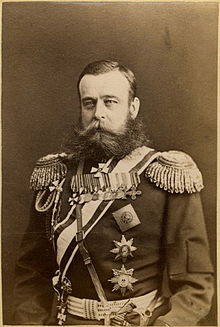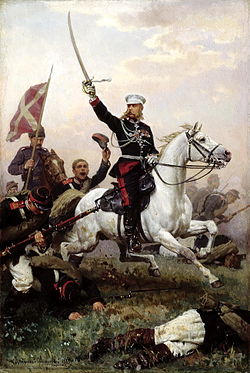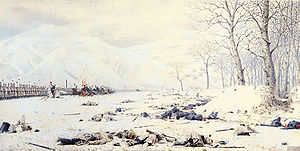- Mikhail Skobelev
-
Mikhail Dmitrievich Skobelev (Russian: Михаи́л Дми́триевич Ско́белев) (29 September [O.S. 17 September] 1843 – 7 July [O.S. 25 June] 1882) was a Russian general famous for his conquest of Central Asia and heroism during the Russo-Turkish War of 1877-78. Dressed in white uniform and mounted on a white horse, and always in the thickest of the fray, he was known and adored by his soldiers as the "White General" (and by the Turks as the "White Pasha"). During a campaign in Khiva, his Turkmen opponents called him goz zanli or "Bloody Eyes". British Field Marshal Bernard Montgomery wrote that Skobelev was the world's "ablest single commander" between 1870 and 1914 and called him a "skilful and inspiring" leader.[1]
Contents
Early life and Conquest of Khiva
Skobelev was born near Moscow on 29 September 1843. After graduating from the General Staff Academy as a staff officer, he was sent to Turkestan in 1868 and, with the exception of an interval of two years, during which he was on the staff of the grand duke Michael in the Caucasus, remained in Central Asia until 1877.
He commanded the advanced guard of General Lomakin's column from Kinderly Bay, in the Caspian Sea, to join General Verevkin, from Orenburg, in the expedition to the Khanate of Khiva in 1874, and, after great suffering on the desert march, took a prominent part in the capture of the Khivan capital. Dressed as a Turkoman, he intrepidly explored in a hostile country the route from Khiva to Igdy, and also the old bed of the Oxus. In 1875 he was given an important command in the expedition against the Khanate of Kokand under General Konstantin Petrovich Kaufman, showing great capacity in the action of Makram, where he outmanoeuvered a greatly superior force and captured 58 guns, and in a brilliant night attack in the retreat from Andijan, when he routed a large force with a handful of cavalry.
Later life, the Battle of Plevna, and Death
He was promoted to be major-general, decorated with the Order of St George, and appointed the first governor of the Ferghana Oblast. In the Turkish War of 1877 he seized the bridge over the Siret at Barboşi (nowadays a neighborhood of Galaţi, where the Siret flows into the Danube) in April, and in June crossed the Danube with the 8th corps. He commanded the Caucasian Cossack Brigade in the attack of the Green Hills at the second battle of Plevna. He captured Lovetch on 3 September, and distinguished himself again in the desperate fighting on the Green Hills in the third battle of Plevna. Promoted to be a lieutenant-general, and given the command of the 16th Division, he took part in the investment of Plevna and also in the fight of 9 December, when Osman Pasha surrendered, with his army. In January 1878 he crossed the Balkans in a severe snowstorm defeating the Turks at Sheynovo, near Shipka, and capturing 36,000 men and 90 guns.
He returned to Turkestan after the war, and in 1880 and 1881 further distinguished himself by retrieving the disasters inflicted by the Tekke Turkomans: following Siege of Geoktepe he captured the city, and, after much slaughter, reduced the Akhal-Tekke country to submission.[2] He was advancing on Ashkhabad and Kalat i-Nadiri when he was disavowed and recalled. He was given the command at Minsk.
In the last years of his short life, Skobelev engaged actively in politics, supporting the ideas of Russian nationalism and militant Pan-Slavism.[3] He has also been credited as one of the earliest promoters of the concept "Russia for Russians".[4] At the beginning of 1882, he made speeches in Paris and in Moscow, predicting a desperate strife between Slavs and Germans.[5] He was at once recalled to St Petersburg. He was staying at a Moscow hotel, on his way to his estate, when he died suddenly of a heart attack on 7 July 1882. In Russia he was a very popular man at the time of his death, and not surprisingly, his death aroused suspicion among many. After all, he was a relatively young (38) and vigorous man. Without a doubt, Skobelev's early death deprived Russia of a great military leader.[6] This became especially evident during the Russo-Japanese War of 1904-05. The Russian commanding generals in that war were men of Skobelev's generation, but none of them had his military genius or charisma.
Skobelev's Memory
After Skobelev's death, in Moscow a monument was raised in his honor on a major square on Tverskaya street, across from the city hall (where today stands the statue of Yuri Dolgoruki the founder of Moscow), which was given his name and the town of Fergana in Uzbekistan was renamed Skobelev.
Today, his name still lives, even beyond his motherland: shortly after the end of the Turkish War of 1877, the grateful Bulgarians constructed a park in Pleven, Skobelev Park, on one of the hills where the major battles for the city took place. The park is also a location of the Panorama Pleven's Epopee 1877 memorial, where in one of the scenes of the gigantic 360 degree panoramic painting the White General is displayed charging with his horse and bare sword, leading the Russian attack on the Turkish positions.
Shortly after the entrance of the park, the bust of the famous general can be seen, watching over the city. The park contains memorials with the names of the Russian and Romanian soldiers that died for the liberation of Pleven, and is decorated with non-functional arms donated by Russia: cannons, cannon balls, gatling guns, rifles, bayonets.
The 1877 comic-opera parody "Abdallah Bulbul Ameer," by Irish balladeer Percy French, and sung by several generations of soldiers, remarks on the general rushing to a fight between a Russian and Turkish hero. "Sko'belev (the gen'ral,) Prince Gorchakov too, drove up - on the Emperor's car! But all they could do was cry 'Daz v'dan-yu,' for Ivan Potschjinski Skiv'dar."
Honours and awards
- This article incorporates information from the Russian Wikipedia.
- Russian
- Order of St. Stanislaus, 1st class with swords
- Order of St. Anna. 1st and 4th classes
- Order of St. George, 2nd, 3rd and 4th classes
- Order of St. Vladimir, 3rd class with swords
- Gold Sword for Bravery
- Gold Sword for Bravery with diamonds
- Gold Sword for Bravery with diamonds for the transition of the Balkans
- Foreign
- Order of the Red Eagle, 1st and 2nd class with swords (Prussia)
- Pour le Mérite (Prussia)
- Grand Cross of the Order of the Cross of Takovo (Serbia)
- Montenegrin Medal
- Serbian Gold Medal for bravery;
- Romanian medal for military valour
Notes
- ^ A Concise History of Warfare by Field-Marshal Viscount Montgomery of Alamein (1968), p. 266, 269. ISBN 0001921495
- ^ Lansdell, Henry (1885) Russian Central Asia: Including Kuldja, Bokhara, Khiva and Merv S. Low, Marston, Searle and Rivington, London, pp. 464-465
- ^ Astrid S. Tuminez (2000), Russian Nationalism Since 1856: Ideology and the Making of Foreign Policy, p. 77. Rowman & Littlefield, ISBN 0847688844
- ^ (Russian) Иванов А. «Россия для русских»: pro et contra // Трибуна русской мысли. Религиозно-философский и научно-публицистический журнал. 2007. № 7. Сентябрь. С. 92.
- ^ Novikova, Olǵa Alekseevna and Skobelev, Mikhail Dmitrievich (1883) Skobeleff and the Slavonic cause, by O.K. Longmans, Greene & Co., London,
- ^ Alexander III wrote: "His loss to the Russian army is one it is hard to replace, and it must be deeply lamented by all true soldiers. It is sad, very sad, to lose men so useful and so devoted to their mission." Novikova, Olǵa Alekseevna and Skobelev, Mikhail Dmitrievich (1883) Skobeleff and the Slavonic cause, by O.K. Longmans, Greene & Co., London, p. 387
References
 This article incorporates text from a publication now in the public domain: Chisholm, Hugh, ed (1911). Encyclopædia Britannica (11th ed.). Cambridge University Press.
This article incorporates text from a publication now in the public domain: Chisholm, Hugh, ed (1911). Encyclopædia Britannica (11th ed.). Cambridge University Press.- Meyer, K.E. and Blair Brysac, S. Tournament of Shadows: The Great Game and the Race for Empire in Central Asia (1999) at pp 161, 165-169, 238.
Categories:- 1843 births
- 1882 deaths
- Russian military leaders
- Wars involving the Ottoman Empire
- Russian military personnel of the Russo-Turkish War (1877–1878)
- Russian people of the January Uprising
- Recipients of the Order of Saint Stanislaus (Russian), 1st class
- Recipients of the Order of St. Vladimir, 3rd class
- Recipients of the Order of Saint George II Class
- Recipients of the Order of Saint George III Class
- Recipients of the Order of St. Anna, 1st Class
- Recipients of the Gold Sword for Bravery
- Recipients of the Order of the Red Eagle
- Recipients of the Pour le Mérite (military class)
- Recipients of the Order of the Cross of Takovo
- Russian nationalists
Wikimedia Foundation. 2010.



